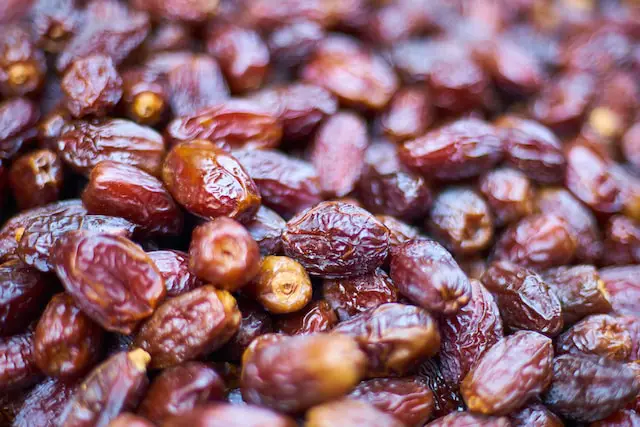Dates are a popular fruit that is widely consumed across the world, especially during Ramadan and other special occasions. They are known for their rich nutritional value, high fiber content, and natural sweetness.
However, like any other food, eating too many dates can have both positive and negative effects on the body. Here’s what happens if you eat too many dates:
- High calorie intake: Dates are high in calories and sugar content. Consuming too many dates can lead to an increase in calorie intake, which can result in weight gain, especially if you’re not engaging in enough physical activity to burn the extra calories.
- Digestive issues: Dates are high in fiber, which can be beneficial for digestion. However, consuming too many dates can also lead to digestive issues such as bloating, gas, and diarrhea, especially if you have a sensitive digestive system.
- High blood sugar levels: Dates are a natural source of sugar and can cause a spike in blood sugar levels, especially if consumed in large amounts. This can be a concern for people with diabetes or those who are at risk of developing diabetes.
- Tooth decay: Dates are sticky and can get stuck between teeth, leading to tooth decay and cavities if not brushed or flossed properly.
- Nutrient imbalance: Dates are a good source of nutrients such as vitamins, minerals, and antioxidants. However, consuming too many dates can also lead to an imbalance in nutrients, especially if they’re eaten in place of other important food groups such as vegetables and protein.
While dates are a healthy and nutritious food, it’s important to consume them in moderation. Eating too many dates can lead to several negative effects, including weight gain, digestive issues, high blood sugar levels, tooth decay, and nutrient imbalances.
To enjoy the benefits of dates, it’s recommended to consume them as part of a balanced diet, along with other important food groups.
Might Lead To Weight Gain
Like any food, consuming too much of it can lead to weight gain, and dates are no exception. Dates are high in natural sugars, which can contribute to weight gain if consumed in excess.
However, dates are also high in fiber, which can help you feel full and satisfied for longer periods, potentially reducing the chances of overeating.

Additionally, dates are a healthier alternative to processed sweets and snacks, which are often high in added sugars and low in nutrients.
Eating too many dates can lead to weight gain, but consuming them in moderation as part of a balanced diet can provide several health benefits and help maintain a healthy weight.
As with any food, it is important to consume dates in moderation and in conjunction with a healthy lifestyle.
Health Benefits Of Dates
Dates are a popular fruit that is known for their natural sweetness, chewy texture, and nutritional value. Here are some of the health benefits of eating dates:
- Rich in fiber: Dates are high in fiber, which can aid in digestion and promote bowel regularity. This can help prevent constipation and improve overall gut health.
- Good source of vitamins and minerals: Dates are a good source of several vitamins and minerals, including vitamin B6, potassium, magnesium, and copper. These nutrients can help support healthy bones, muscles, and blood vessels.
- Antioxidant properties: Dates contain antioxidants, such as flavonoids and carotenoids, which can help protect cells against damage from free radicals. This can help prevent chronic diseases such as cancer, heart disease, and Alzheimer’s.
- Energy boost: Dates are high in natural sugars such as glucose, fructose, and sucrose, making them a great source of energy. They also contain carbohydrates and protein, which can help sustain energy levels throughout the day.
- Anti-inflammatory properties: Dates contain compounds that have anti-inflammatory properties, such as quercetin and ferulic acid. These compounds can help reduce inflammation in the body, which can contribute to the prevention of chronic diseases.
- Support for pregnancy and labor: Dates are traditionally consumed during pregnancy and labor due to their high nutrient content. They can provide essential nutrients such as folate and iron, which are important for fetal development and maternal health.
Dates are a nutritious and healthy food that can provide several health benefits. They are a good source of fiber, vitamins, minerals, antioxidants, and energy, and can help prevent chronic diseases and support pregnancy and labor.
Nutritional Information
Dates are a nutritious fruit that is rich in several essential nutrients, including vitamins, minerals, fiber, and antioxidants. Here is the nutritional information for a 100-gram serving of dates:
- Calories: 277
- Carbohydrates: 75 grams
- Fiber: 7 grams
- Protein: 2 grams
- Fat: 0.4 grams
- Vitamin B6: 0.2 mg (10% of daily value)
- Potassium: 696 mg (20% of daily value)
- Magnesium: 54 mg (14% of daily value)
- Copper: 0.4 mg (18% of daily value)
Dates are also a good source of other essential nutrients, including iron, calcium, and vitamin K.

One of the most notable nutritional benefits of dates is their high fiber content. A 100-gram serving of dates provides about 7 grams of fiber, which is about 27% of the recommended daily intake for adults. This fiber can help promote healthy digestion and prevent constipation.
In addition, dates are a good source of antioxidants, such as flavonoids and carotenoids, which can help protect against damage from free radicals and prevent chronic diseases such as cancer, heart disease, and Alzheimer’s.
Conclusion
Dates are a nutritious and delicious fruit that offer a range of health benefits. They are high in fiber, natural sugars, and essential nutrients, including vitamins, minerals, and antioxidants.
Dates can promote healthy digestion, sustain energy levels, and prevent chronic diseases such as cancer, heart disease, and Alzheimer’s.
They are also traditionally consumed during pregnancy and labor due to their high nutrient content. Incorporating dates into your diet can be a simple and enjoyable way to improve your overall health and well-being.
